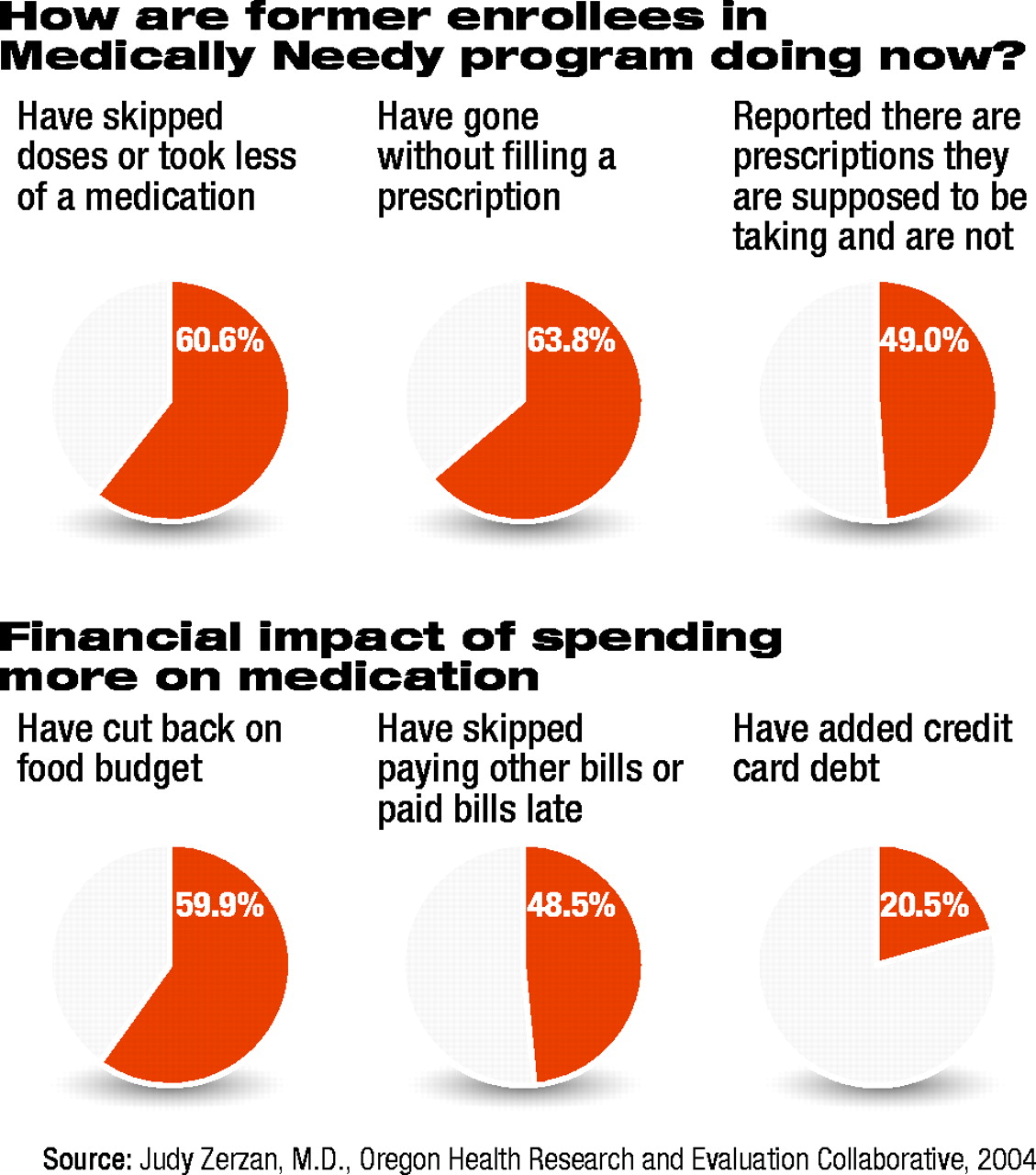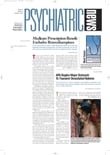A former beneficiary of Oregon's Medically Needy program described her current dilemma, “My total income is $740 a month. My total medical bill is $912 a month. You do the math.”
That stark assessment took place in one of a series of focus groups convened by the Kaiser Commission on Medicaid and the Uninsured (KCMU) to consider the impact of Medicaid cost-saving measures in Oregon.
The groups met in Portland in February 2004, a year after the state had cut benefits to its Oregon Health Plan (OHP) Standard population and increased their premiums and cost-sharing requirements (Psychiatric News, April 4, 2003; July 16, 2004).
OHP Standard beneficiaries include parents and adults who are not eligible for Temporary Assistance for Needy Families or general assistance. They are poor, however; their income cannot exceed the federal poverty level. The group generally is known as the Medicaid-optional population.
The state also eliminated its Medically Needy program, an optional Medicaid service that provides benefits to individuals whose high medical expenses reduce their available monthly income to a level specified by each state. Oregon had set the monthly income limit at $413 or less and provided benefits to nearly 9,000 people.
“The Impact of Medicaid Reductions in Oregon: Focus Group Insights” was released in December 2004.

Prescription Drugs vs. Meals
Seven individuals, all of whom have chronic and debilitating illnesses, made up the focus group of those who had lost coverage through the Medically Needy program.
They reported that loss of prescription drug coverage had led to significant problems because prescription drugs currently are not covered by Medicare, and they are taking multiple medications.
Their comments echoed the findings of a survey conducted by Judy Zerzan, M.D., of the Oregon Health Research and Evaluation Collaborative. She surveyed a sample of the population six months after the program ended.
Respondents reported needing an average of 5.5 prescriptions each month. Twenty-six percent reported a prescription for an antipsychotic medication.
Sixty percent reported that they had cut back on their food budget to pay for medications, and nearly half reported that they had skipped paying bills, paid bills late, or borrowed money from family or friends to pay for medications (see pie charts on facing page).
Enrollment Halved
Enrollment in the OHP Standard program declined from approximately 102,000 in January 2003 to 46,520 in October 2004, according to data supplied by state officials to the KCMU.
Ten individuals constituted the focus group of those who had become“ disenrolled” from the OHP Standard program.
Respondents reported difficulties paying the increased premiums of $6 to $20 a month. One former enrollee said, “I mailed my payment in, and I was late and kicked off. My doctor and the hospital wrote letters trying to get them to budge, and they wouldn't budge and so I lost.”
At the time of the focus group, an individual was disenrolled after being late with one payment, but could attempt to reenroll after six months. Enrollment was closed as of July 2004, however, eliminating any possibility of reenrollment.
Those who lost coverage reported that they relied on clinics, emergency rooms, prescription drug donation programs, and drug samples for their health care needs.
One woman said, “I was on seven prescriptions when I came off the plan. My pharmacist at my clinic has been working with me and kept me on three of them.”
Members of the group believe that their health has deteriorated and are fearful of becoming seriously ill.
Enrollees in OHP Standard initially lost coverage for mental health services, durable medical equipment, and dental and vision services. Coverage for mental health services has since been restored.
Twenty OHP Standard enrollees participated in two focus groups of 10 members each.
At the time of the focus group, mental health benefits had not been restored. Problems stemming from the loss of that coverage were particularly pronounced, according to the report.
Members of the focus group said that although they were able to get antipsychotic medications, they could not receive counseling. One member of the group spoke about the difficulty of getting those medications from her primary care doctor.
Another group member told of having a tooth pulled, leaving a “big hole” in her mouth, because it was the only free treatment available.“ I'm only in my 40s, and they said every time I get a toothache, they'll just take another tooth until OHP covers it again.”
At press time, Tennessee Gov. Phil Bredesen (D) announced that he was eliminating health care coverage for approximately 323,000 of the state's residents enrolled in TennCare, the state's program for Medicaid beneficiaries and other needy residents.
Like Oregon, Tennessee built on its Medicaid program to provide benefits to poor, disabled, and uninsurable people who do not meet all of Medicaid's eligibility criteria.
The state will impose limits on the number of prescription drugs and physician visits for the remaining 396,000 adults enrolled in the program.
The 612,000 children enrolled in the program will not be affected by these cuts.
Analysis of the potential impact of the cuts will appear in a future issue of Psychiatric News.
“The Impact of Medicaid Reductions in Oregon: Focus Group Insights” is posted online at<www.kff.org/medicaid/7233.cfm>.▪

